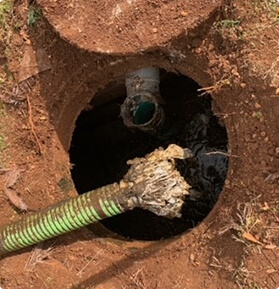Pumping
The only way to keep your septic tank system functioning properly is to have the tank solids pumped. While the need for pumping depends on size, usage and wastes added, it is recommended by many local health authorities and the Environmental Protection Agency that a system be pumped every 3 to 5 years. While the pumping frequency may vary, every septic tank should be pumped every 5 to 7 years’ maximum. Failure to maintain a regular pumping schedule, or the use of additives can cause more solids to pass through the septic tank increasing the likelihood of drain field failure.
It is only during a pump out that the septic tank can be inspected for possible leaks and the baffles inspected. These are the only things that generally go wrong with a septic tank itself. If either of these fail, it is a serious problem that must be addressed immediately. The baffles help prevent grease, oils, and solids from passing through the septic tank to the drain field. The inlet and outlet baffle can only be inspected during a cleanout. If the baffles are damaged in any way, they must be replaced immediately. The is less costly than drain field replacement. The most common Septic System Care program consists of pumping the tank every few years and then the system is forgotten about. This pattern can continue for many years, however, there will come a time that your system will need serious attention and costly replacement. Septic Systems fail when the absorption field no longer accepts and filters the drain water from your home. The septic tank, which is designed to separate and decompose the solid waste from the homes drain water, overflows with excess water and waste when the absorption field no longer accepts water. The result is smelly septic gasses; slow running drains, soggy lawn and frequent pumping of the septic tank.
We are all guilty of abusing our septic tank at some point in time. It may range from excessive water usage, failure to repair a leaky faucet, or dumping some hazardous solvents or liquids down the drain. A simple rule is “If you cannot eat it, then it probably will be damaging or difficult for your septic system to process”!
Our company will come out and locate your septic tank, dig it up, (by shovel if the lid isn’t deeper than 1’ underground) if it is deeper, we will get your utilities located and come back with a backhoe and did up your lid. We then will pump your tank, unstop the line from the house to the tank, and make sure everything is flowing smoothly, put the lid back on.
Inspection
Septic Tank Status Report
Our company sends a Septic Tank Status Report. This report contains the conditions of the drain and sewer lines, the location of the drain line, and the consistency of the sludge. These are the main issues that generally can go wrong with a system. If either of these fails, you will want to address these matters immediately.
During an inspection, our techs will check to determine the following:
- Type of system (septic tank, aeration system, etc.)
- Size of tank
- Depth of tank
- Location of the tank from the home
- Type of pipe and tee
- System waterlogged
- Liquid and solids in the tank at the proper level
- Surface discharge or seepage
- Water draining properly from home
- Outlet tee in place
- Tank in good condition and working properly
- Lids and risers are in good condition
For information on repair permits, please contact the Bartow County Environmental Health Department – Northwest Health Northwest Health (nwgapublichealth.org)
Septic Tank Installation or Repair
Septic Tank Installation New
Are you building that dream home or needing a tank installed? We can take care of that for you. Contact your local health department environmental division for a permit and give us a call.
Septic Tank Repair
If your tank or drain lines are failing, we can assist to get your system working again or install/repair what’s needed. Contact us for inspection and quote.

